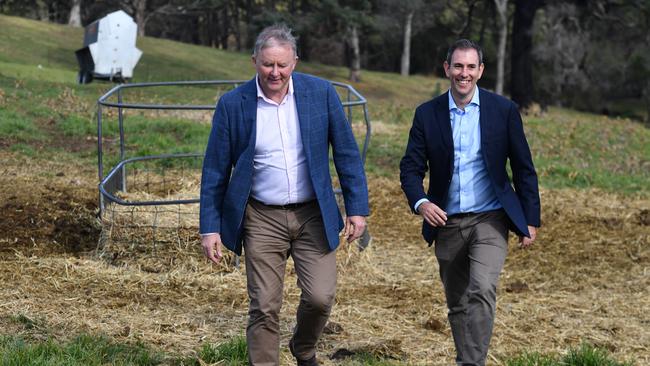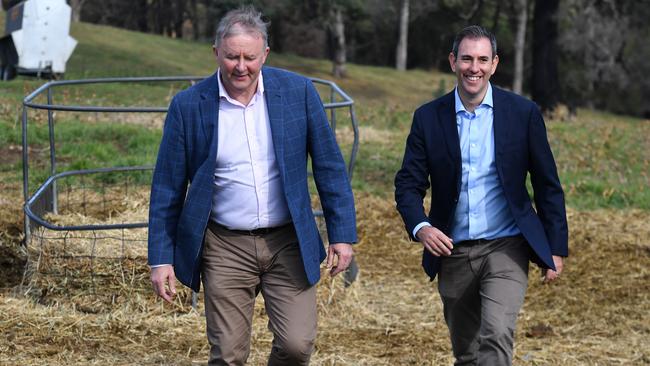Labor rolls out its agriculture plan: $500m food, fibre and forestry fund
An ag visa is on the cards as well as a $500m fund to bolster agriculture, forestry and fisheries. See all Labor’s ag policies ahead of next week’s federal election.

Federal Labor has promised to spend $500 million on a regional construction fund, bolster biosecurity and support the fishing industry and native timber forestry as part of its agriculture and regional communities statement due out today.
A copy of the statement, seen by The Weekly Times, states that if elected Labor would also deliver a dedicated Agriculture Workers Visa, clearer food labelling and scrap the water rule that currently restricts timber plantations established in higher-rainfall regions from competing in carbon markets.

Labor has also committed to accelerate the rollout of the Coalition’s Government’s $4 billion Emergency Response Fund, promising an elected Labor Government would replace it with a Disaster Ready Fund that invest up to $200 million annually on mitigation projects to help reduce the impact of disasters when they happen.
Labor has also promised to make unfair contract terms illegal for businesses with fewer than 100 staff or a turnover of less than $10m new protection from unfair terms.
The policy will include small farms and agricultural contractors and suppliers, which meet the above definition.
LABOR’S AGRICULTURE AND REGIONAL COMMUNITIES STATEMENT STATES IT WILL:
SPEND $500 MILLION FROM LABOR’S NATIONAL RECONSTRUCTION FUND
To help diversify the sector, open up new possibilities for trade and create more jobs and economic activity in the regions, Labor has announced it will reserve $500 million of its National Reconstruction Fund specifically for agriculture, forestry, fisheries, food and fibre.
Labor’s National Reconstruction Fund is also available to support regional businesses such as in food manufacturing as they meet the challenges of entering new markets, the adoption of new technologies or processes and adapting to a low carbon world.
Labor’s National Reconstruction Fund will support investment in value-adding production, expand the domestic and export market and strengthen our national supply chain resilience.
ADDRESS THE AGRICULTURE WORKFORCE SHORTAGE
We know there is a crippling workforce shortage across the agriculture sector. There are shortages of skilled workers right across the economy, and agriculture is no different.
An elected Albanese Labor Government will deliver a dedicated Agriculture Workers Visa that not only provides portability but also protections for workers. Labor’s ag visa will draw on the stability of the Pacific Australia Labour Mobility program.

Labor will establish Jobs and Skills Australia as a national partnership to drive VET education and strengthen workforce planning by working together with employers, unions and the training and education sector.
We will also create 465,000 new fee-free TAFE places in areas of demonstrated labour shortage. These fee-free TAFE placements will help rebuild industries hit hardest by the pandemic, like hospitality and tourism, as well as meet current and future needs in the care economy, including jobs like child care, aged care, disability care, nursing and community services.
ESTABLISH A DISASTER READY FUND
The Morrison Government established the $4 billion Emergency Response Fund in 2019 to invest in disaster relief and mitigation. Unfortunately, it has barely spent a cent from the fund, instead treating it like a term deposit.
An elected Albanese Labor Government will replace the Emergency Response Fund with a Disaster Ready Fund, and we’ll use that fund to invest up to $200 million a year on mitigation projects to help reduce the impact of disasters when they happen.
UNFAIR CONTRACT PROTECTION FOR SMALL FARMERS
An Albanese Labor Government will improve protections for farmers against unfair contract terms with meaningful protection, safeguarding small business, contractors and smaller scale suppliers from exploitation.
Labor would make unfair contract terms illegal, giving businesses with fewer than 100 staff or a turnover of less than $10 million genuine protection against dodgy contracts.
Once dodgy contracts are illegal, the competition watchdog will be able to issue civil penalties to those who use them.
This policy will include small farms and agricultural contractors and suppliers, which meet the above definition. Labor will finally legislate this reform which the farm sector and small businesses have been calling for.
AGRI TECH HUB
An elected Albanese Labor Government will invest $16.7 million towards establishing an Agri Tech Hub in Richmond NSW.
The hub will include a high-tech industry partnered greenhouse array, supported by industry engaged research clusters in food technology, land use management and consumer demand. It will focus on creating jobs, attracting industry, and developing a sustainable approach to future peri-urban farming in our increasingly complex and changing cities, and on a global scale.
ENSURE CLEARER LABELLING
To support meat and plant industries an elected Albanese Labor Government will improve existing regulations that deliver accurate and clear food labelling for products so that consumers have informed choice.
Labor will also commit to working with the seafood and hospitality sectors to implement mandatory country of origin labelling to support the Australian seafood industry.
SUPPORT INDUSTRY EVENTS AND FORUMS
An elected Albanese Labor Government will provide $6 million for Beef Week 2024 – Australia’s largest beef expo.
Labor will provide $6 million towards other regional trade events including Casino Beef Week, LambEx, horticultural conferences and agritech industry events.
Labor will also support the convening of a 2nd Dairy Symposium.
BOLSTER BIOSECURITY
The Morrison Government has weakened our vital biosecurity system with years of under-resourcing. For almost a decade, multiple Agriculture Ministers have failed to establish a long-term funding arrangement for the nation’s biosecurity system.
That’s why an elected Albanese Labor Government will deliver long-term, sustainable funding that will go directly to strengthening Australia’s biosecurity system.
Labor will improve biosecurity capabilities including addressing the potential impact of lumpy skin disease, supporting the adoption of livestock traceability reforms and reducing the impact of pests and weeds.
Labor will also double the number of Indigenous Rangers and boost funding for Indigenous Protected Areas which will assist with the early detection of exotic animal disease in those areas.
A Labor Government will strengthen Australia’s biosecurity system across mail centres and airports.
To help keep pests, weeds and disease out of Australia, Labor will boost our biosecurity services by providing an additional 20 biosecurity detector dogs.
To support our canine response, Labor will also provide for an additional 10 biosecurity detector dog handlers.
SUPPORT FORESTRY AND ADDRESS THE TIMBER SHORTAGE
An elected Albanese Labor Government will provide almost $220 million to expand the work of the National Institute for Forest Products and Innovation, continue the rollout of Regional Forestry Hubs to work with industry and state and local governments, and for grants targeted at better utilisation of logs and fibre, value adding and supporting the industry to continue to reduce its carbon footprint.
Labor will also provide $86.2m for the establishment of new plantations to secure future wood supply and $4.4m towards Australia’s illegal logging traceability and timber identification systems.
And the forestry sector can expect a share of investment through the $500m for agriculture, forestry and fisheries under the National Reconstruction Fund.
Labor has reiterated its policy of removing the water rule in relation to the Emissions Reduction Fund and carbon farming, helping to encourage growth in the plantation resource across the country.
In addition to these measures an elected Albanese Labor Government will:
INVEST $10m to support programs which deliver qualifications, competencies and other credentials which meet the specific training and accreditation needs of the forest, wood products, pulp and paper and fibre sectors.
CONDUCT an analysis of the national wood volume and the commercial opportunities from fire mitigation activities to ensure valuable wood resources are not wasted amid a timber shortage.
HOLD a roundtable with the forestry sector, unions, States and Territories as part of the development of a Timber Fibre Strategy to ensure our existing forestry resources are being best utilised.
The Master Builders Association and the Australian Forest Products Association say Australia is heading towards a deficit of 250,000 timber house frames by 2035.
Labor’s continued commitment to remove the water rule will mean more trees in the ground.
Investment in innovative ways to use the timber resources we have to make new building materials will help stop construction costs from continuing to soar.
(The water rule currently excludes plantations in zones that receive more than 600mm of annual rainfall and farm forestry in zones with receive more than 400mm from competing in the carbon market).
SUPPORTING SUSTAINABLE FISHERIES
Labor has always recognised the social, cultural, economic, and community significance of Australia’s recreational and commercial fishing sectors, and seafood industry participants.
Labor acknowledges the vital role fishers played in working with us in government to design the national marine parks. This was a remarkable achievement of which we can all be proud.
While in the lead-up to the 2019 election we believed there was scope to consider adjustments to park boundaries and zonal classifications, we accept that since that time the network has been delivered in a settled form.
Certainty in park management is critical and we don’t intend to revisit that matter.
As fishers know better than most, our oceans and the biodiversity they support are under increasing pressure, including from plastic pollution and climate change, and it is vital we keep pursuing effective protection and restoration efforts.
To that end, Labor supports the Government’s recent announcement of a Cocos-Keeling and Christmas Island marine park, and a Labor Government will ensure the statutory review process of the national marine park network is carried out in a timely and consultative manner, with any changes considered on the basis of science and stakeholder consultation.
An elected Albanese Labor Government will provide $4m to small States and Territory Governments, such as the Northern Territory, to address existing capacity shortcomings in managing state marine parks. We will be proactive in helping to develop the global treaty on marine plastic pollution that was recently agreed at UNEA.
Labor has consistently opposed the operation of foreign ‘super trawlers’ that would undermine the health of Australia’s commercial and recreational fisheries, and we will give consideration in government to a framework that addresses the importation of seafood from fisheries in our region that involve illegal, unreported, and unregulated fishing practices, noting this already occurs in the US and EU.
Labor is mindful of the harm caused by invasive marine species and have been critical of the Government’s failure to include any Australian marine species in its flawed Threatened Species Strategy 2015-2020.
REDUCE GREENHOUSE GAS EMISSIONS
An elected Albanese Labor Government will work with farmers to develop more solutions to act on climate change and reduce greenhouse gas emissions.
Alongside the economic benefits, Labor’s Powering Australia plan will reduce Australia’s emissions by 43 per cent by 2030 – which will become Australia’s target under the Paris Agreement, keeping us on track for net zero by 2050.
As part of this policy Labor has already announced $8m to encourage the development of the Australian seaweed farming industry. This research is important with the use of asparagopsis in feed when it comes to reducing methane emissions from livestock.
Our Powering Australia plan shows 604,000 jobs will be created with five out of six of those being in regional areas.
SUPPORT REGIONAL DEVELOPMENT
Labor believes it is time for a revitalisation of the Regional Development Australia structure and purpose.
Labor wants to see a much stronger partnership with local government in this regard.
We need a more coherent and logical architecture for how federal government works in the regions.
In this context, the NFF’s current regional precinct proposal is timely, and well-considered.
While Labor would seek to invest in all regions across Australia, we will consider the proposed approach from the NFF, along with other stakeholders, as we reinvigorate and rejuvenate the regional development structures that we will inherit, should we form government.
Right now, Northern Australia needs stable leadership and investment from our Federal Government.
INVESTING IN REGIONAL ROADS AND RAIL
Labor has a strong track record delivering roads and rail across regional Australia.
An elected Albanese Labor Government will continue to build Australia’s road and rail networks that are key to getting agricultural produce to market and keeping supply chains moving.
This includes $250 million towards expanding the Local Roads and Community Infrastructure program to support projects and upgrade roads in every part of Australia – particularly in outer-urban and regional areas.
Labor will also put the focus back on nation-building infrastructure using the Infrastructure Australia model.
GETTING INLAND RAIL BACK ON TRACK
Labor supports Inland Rail and recognises the benefits this nation building project will bring to producers, businesses and communities along the route.
Indeed, it was the last Labor Government that invested $900 million to progress this project to the construction stage.
An Albanese Labor Government will do the hard work of getting this project back on track, closely guided by the recommendations of the senate inquiry into the project.
This will include listening to farmers and communities concerned by the project’s potential impacts and continuing the business case into extending the project to the Port of Gladstone.
BETTER CONNECTIVITY
Better mobile coverage on roads, as well as improved connectivity for regional communities and on farms, will lead an Albanese Labor Government’s approach to upgrading regional telecommunications.
A key element of Labor’s Better Connectivity for Rural and Regional Australia Plan will be the establishment of a $400m fund to expand multi-carrier mobile coverage along roads, as well as for regional homes and businesses.
To support this, Labor will commit $20m, to commence an independent national audit of mobile coverage in 2022, to establish an evidence baseline to guide future priorities.
A competitive tender process will be used to identify a partner company capable of placing mobile signal measurement devices on Australia Post’s transport assets, to gather the best information possible.
Priorities will be assessed independently to maximise benefits, and this will include consultation with Infrastructure Australia, and the broader community.
Labor will also commit $200m to continue investing in place-based connectivity projects.
Drawing from the Regional Connectivity Program, funded projects could include better mobile voice and data coverage, targeted fibre deployments and improved microwave and fibre backhaul capacity to locations across regional and remote Australia.
To support the productivity and safety of our farmers, Labor will also commit $30 million to help expand on-farm connectivity and enable better wireless extension solutions on the field.
This will enable more farmers to fully utilise sensor and connected-machinery technology to improve the efficiency of domestic food production and support the export growth potential of the sector.
Labor will boost funding for the Regional Tech Hub by $6 million to serve as a trusted intermediary and source of free and independent advice.
These initiatives supplement existing commitments Labor has made to:
EXPAND full-fibre NBN access to 660,000 more regional homes and businesses.
UPGRADE the NBN fixed-wireless network to offer speeds between 100 and 250 megabits per second for all users.
INCREASE NBN satellite data allowances to 90 gigabytes a month and unmetered data between midnight and 4pm, with an ambition to go beyond 100 gigabytes.
HOUSING SUPPORT FOR THE REGIONS
Labor knows how hard it is when it comes to getting into the housing market.
Last year housing prices in the regions jumped by 26 per cent, with some centres closer to 50 per cent.
Labor’s Housing Australia Future Fund will build social and affordable housing now and into the future including in regional centres. This will create jobs, build homes and change lives.
We will also help 10,000 Australian families a year in regional areas to buy their first home.
This will triple the number of places that Australians living in regional areas received last year under the current First Home Loan Deposit Scheme.
A Labor Government will also create a new Help to Buy program.
It’s a national shared equity scheme that will provide an equity contribution from the Commonwealth Government for 10,000 aspiring homeowners on low and middle incomes, every year.
If you have saved two per cent of your deposit, we will contribute up to 40 per cent of the purchase price of a new home or 30 per cent for an existing home.
Help to Buy will assist Australians to buy a home with a smaller deposit, a smaller mortgage and smaller mortgage repayments.




